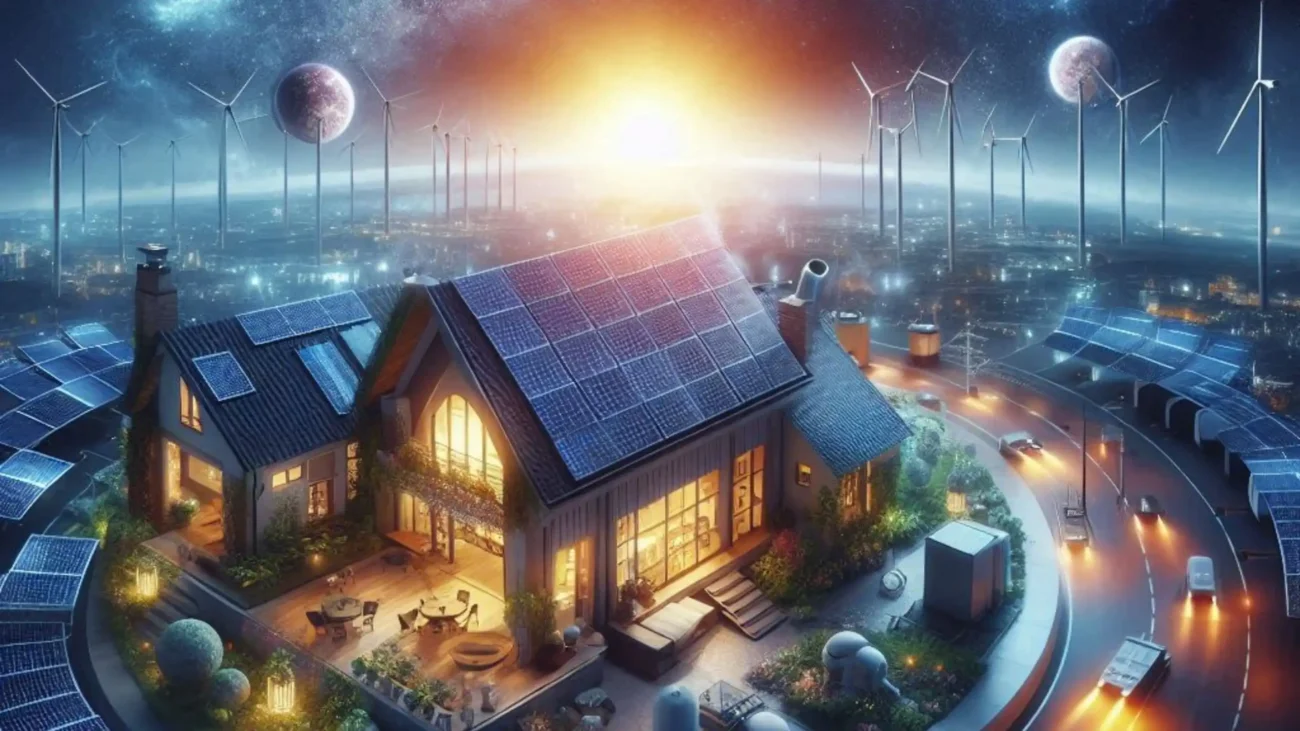The global shift towards renewable energy has made solar systems an increasingly popular option for homes and businesses. Solar systems harness the power of the sun to generate clean, sustainable energy, offering numerous benefits such as reduced electricity bills, environmental conservation, and energy independence. In this guide, we explore the essential components, types, and advantages of solar systems, as well as how you can choose the best solar system to meet your energy needs. solar gadget
In This Post
What is a Solar System?
A solar system, also known as a photovoltaic (PV) system, converts sunlight into electricity. It consists of several key components that work together to capture solar energy and transform it into usable power for your home or business. Solar systems are scalable, meaning they can be installed for small residential purposes or for large-scale commercial projects. With advances in technology, solar energy has become more efficient and affordable, allowing more people to embrace renewable energy solutions.
Components of a Solar System
Understanding the basic components of a solar system can help you make informed decisions when planning an installation. Here are the primary components: solar gadget reviews
1. Solar Panels
Solar panels are the most visible and critical part of any solar system. These panels are made up of solar cells, which capture sunlight and convert it into direct current (DC) electricity. Solar panels are typically installed on rooftops or ground-mounted in areas with high exposure to sunlight. The efficiency and output of solar panels depend on the quality of the solar cells and the amount of sunlight they receive.

2. Inverter
The electricity generated by solar panels is in the form of direct current (DC), but most homes and businesses run on alternating current (AC). The inverter is responsible for converting DC into AC electricity, making the energy usable for household appliances and devices. There are different types of inverters, including string inverters, microinverters, and hybrid inverters, each with unique advantages depending on your system setup.
3. Battery Storage (Optional)
Some solar systems include a battery storage option, which allows you to store excess energy generated during the day for use at night or during cloudy periods. This feature is particularly useful for achieving greater energy independence and reducing reliance on the grid. Lithium-ion batteries are the most common type used in solar systems due to their long lifespan and high efficiency. ranksfocus.com
4. Mounting Systems
Mounting systems are used to secure the solar panels in place, whether on the roof, ground, or other structures. These systems are designed to withstand various weather conditions and maximize the panels’ exposure to sunlight. Depending on the architecture of your home or business, you can choose between fixed tilt or tracking systems, the latter of which follows the sun’s movement for optimal efficiency.
5. Monitoring System
Modern solar systems often come with monitoring tools that allow users to track their energy production and usage in real-time. These systems provide insights into the performance of your solar panels, helping you identify any issues and optimize energy consumption.
Types of Solar Systems
There are three primary types of solar systems available for residential and commercial use, each offering unique benefits depending on your energy goals and location.
1. Grid-Tied Solar Systems
A grid-tied system is the most common type of solar installation. It is connected to the electrical grid, allowing you to draw power from the grid when your solar panels are not producing enough energy. In many cases, homeowners can also feed excess energy back into the grid in exchange for credits on their electricity bills, a practice known as net metering. Grid-tied systems are highly efficient and cost-effective for those who don’t need complete energy independence. blog
2. Off-Grid Solar Systems
An off-grid system operates independently of the electrical grid and is often equipped with battery storage to provide a reliable power source even when sunlight is limited. This type of system is ideal for remote locations or those looking for total energy autonomy. Off-grid systems are typically more expensive due to the need for battery storage but can be highly rewarding for those seeking self-sufficiency.
3. Hybrid Solar Systems
A hybrid system combines the features of both grid-tied and off-grid systems. It is connected to the electrical grid but also includes battery storage for backup power. This type of system offers flexibility by allowing you to use solar energy during the day, store excess power for later use, and draw from the grid when needed. Hybrid systems are increasingly popular for homeowners who want a balance between energy independence and affordability.

Benefits of Solar Systems
Solar energy has become one of the most viable and beneficial renewable energy sources. Here are some of the most notable benefits: solar guides
1. Reduced Electricity Bills
One of the most significant advantages of installing a solar system is the potential for lower energy bills. By generating your own electricity, you can reduce or even eliminate your dependence on the grid, leading to significant savings over time. With net metering, you can also earn credits for excess energy produced, further reducing your monthly expenses.
2. Environmental Impact
Solar energy is a clean and renewable resource, meaning it does not produce harmful greenhouse gas emissions or pollute the environment. By transitioning to solar energy, you can significantly reduce your carbon footprint and contribute to the fight against climate change.
3. Energy Independence
Installing a solar system can give you greater control over your energy usage and protect you from fluctuating electricity prices. For those living in remote areas, an off-grid solar system provides energy independence and reliability, especially in regions where power outages are frequent. travelers
4. Increased Property Value
Homes equipped with solar panels often see an increase in property value. Buyers are attracted to the long-term cost savings and environmental benefits associated with solar energy. This can make your home more appealing in a competitive real estate market.
5. Government Incentives
Many governments offer financial incentives, such as tax credits, rebates, and grants, to encourage the adoption of solar energy. These incentives can significantly reduce the upfront cost of installing a solar system, making it more accessible for homeowners and businesses.

How to Choose the Right Solar System
Choosing the right solar system for your needs involves careful consideration of several factors:
1. Energy Consumption
Start by evaluating your current energy consumption. Check your electricity bills to determine how much energy you use on average, and consider whether your goal is to offset a portion or all of your energy needs with solar power. blog
2. Location and Sunlight Exposure
The location of your home or business and its exposure to sunlight will greatly influence the effectiveness of a solar system. Areas with high amounts of sunlight are ideal for solar installations, but even locations with less sun can still benefit from solar energy with the right system and setup.
3. Budget and Financing Options
Solar systems can be a significant investment, but they pay off in the long run through reduced energy bills and tax incentives. Consider your budget and explore financing options, such as solar loans, leases, or Power Purchase Agreements (PPAs), to make solar more affordable.
4. Roof Condition
If you plan to install solar panels on your roof, ensure that it is in good condition. A roof in need of repair or replacement should be addressed before installing solar panels to avoid future complications.
Conclusion
Solar systems offer a sustainable and efficient way to power homes and businesses, with numerous environmental and financial benefits. Whether you’re looking to reduce your energy bills, minimize your carbon footprint, or achieve energy independence, a solar system can be customized to meet your specific needs.
FAQs: Solar Systems
1. What is a solar system?
A solar system is a setup that converts sunlight into electricity. It uses solar panels to capture the sun’s energy and an inverter to convert it into usable electricity for homes or businesses. Solar systems may also include batteries to store excess energy for later use.
2. How does a solar system work?
Solar systems capture sunlight through solar panels, converting it into direct current (DC) electricity. An inverter then converts this into alternating current (AC) electricity, which powers your appliances. Any surplus energy can be stored in batteries or sent back to the electrical grid.
3. What are the main types of solar systems?
There are three primary types:
- Grid-tied systems: Connected to the electrical grid, allowing you to draw power from the grid and export excess energy back to it.
- Off-grid systems: Operate independently of the grid and rely on battery storage.
- Hybrid systems: Combine grid-tied and off-grid features, offering battery storage along with grid connectivity.
4. What is net metering?
Net metering is a billing mechanism that credits solar energy users for the electricity they add to the grid. When your solar panels produce more energy than your home uses, the excess is sent to the grid, and you receive credits on your electricity bill.
5. Are solar systems expensive?
While solar systems can have high upfront costs, they provide long-term savings by reducing electricity bills. Additionally, many governments offer incentives, such as tax credits and rebates, which can lower the initial cost.
6. Do solar systems work during a power outage?
Grid-tied solar systems typically do not work during a power outage for safety reasons unless they have a battery backup. Systems with batteries or off-grid setups can continue to provide electricity during an outage.
7. How long do solar panels last?
Solar panels generally have a lifespan of 25 to 30 years. Their efficiency may decrease slightly over time, but they will continue to produce electricity well beyond their warranty period.
8. Are solar systems environmentally friendly?
Yes, solar systems use a renewable energy source and do not emit harmful greenhouse gases during operation. This makes them a sustainable option for reducing carbon footprints and promoting cleaner energy production.
9. Do solar systems require maintenance?
Solar systems require minimal maintenance. Regular cleaning of solar panels to remove dust or debris ensures optimal efficiency. Professional inspections every few years can help detect any issues early.
10. Can solar systems increase property value?
Yes, homes with solar systems often see an increase in property value. Many homebuyers are attracted to the energy savings and environmental benefits that come with solar installations.
